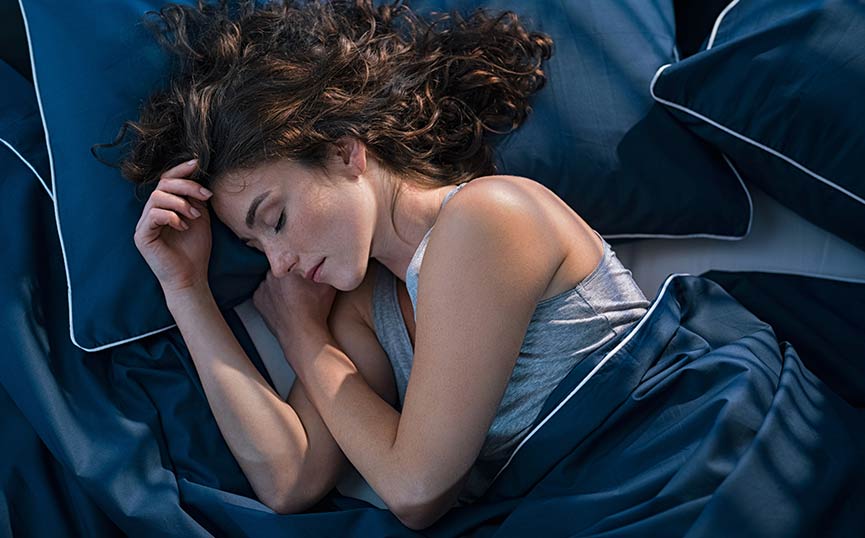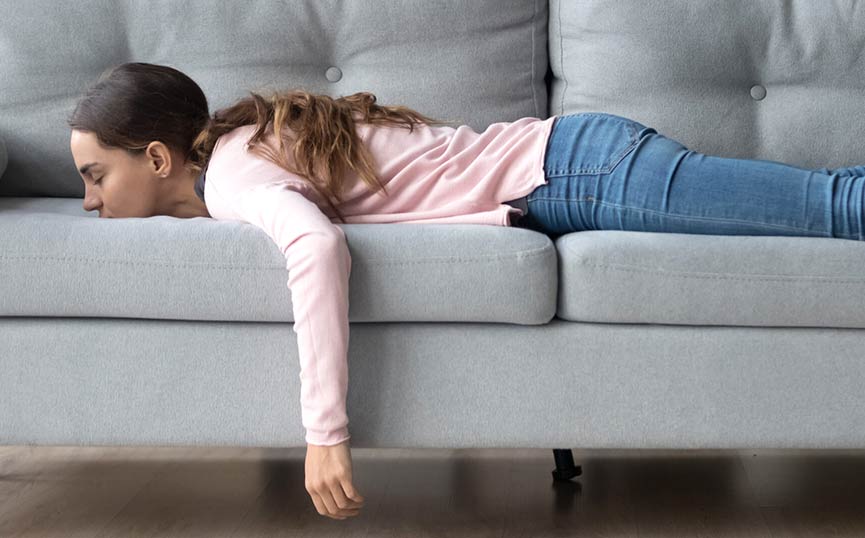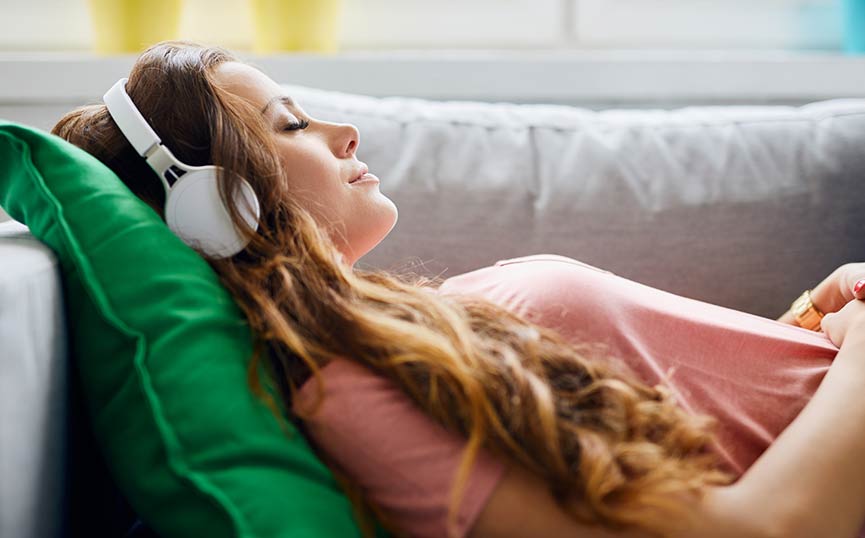Sleep support
Sleep is such a seemingly simple process that ends with a great end result: happiness and freshness. Though the procedure that takes place in our body is rather complicated; for many of us, falling asleep itself is a process that requires enormous effort. Due to the constant awakenings, a good night's sleep can often be missed.

For an early sleep
Stress is what really kills our restful night. Not only do we wake up several times because of it, but we can't even fall asleep. Therefore, the first step is to manage stress, because improving the quality of sleep is of no use if we cannot even fall asleep. That is why we offer a number of products that optimize stress hormones.
The most important of these are: valerian root, hops and St. John's wort, whose active ingredients calm the nervous system by acting through the main calming brain hormone (GABA - gamma amino butyric acid) and/or the happiness hormones.1-6 These should be used one hour before going to bed.
Great! There is our evening calm. But what if we overwork our brains during the day? The solution is rhodiola root, which adjusts the hormonal response to the specific situation to be solved by means of an adaptogen. A real miracle plant, which was already used by the Vikings to increase performance, but to this day we still don't really understand what its secret is. It doesn't matter how it works as long as it does good, right? Numerous studies have been published confirming its effects.7-14 Use during the day, preferably in the morning to achieve the right effect.
There is another important aspect of restful sleep, to understand which it is important to know that the two phases of sleep alternate cyclically.15 Namely, the REM (rapid eye movement) and non-REM phase. Non-REM occurs first, followed by REM, as soon as the second one ends, a sleep phase has passed.
The effects are different in both phases, hormones are secreted in different amounts and even the brain activity is different. Therefore, to achieve the most balanced and relaxing effect of our sleep, it is worth getting up at the end of a cycle. So we have to set our alarm so that we get up at the end of the REM phases.
The ends of the REM phases (it is worth adjusting the alarm to this):
- The first phase ends ~ 2.5 hours after the start of sleep
- The second one in 4.5 hours
- The third one in 5.5 hours
- The fourth one in 6.5 hours
- And the fifth one in 8 hours

How can the quality of sleep be further improved?
The real big gun is the sleep hormone - namely melatonin, which is a naturally occurring compound (also produced by plants). And in our brains, it drastically increases the hormonal response to sleep, such as:
- Growth hormone levels18
- Production of serotonin, i.e. happiness hormone20
- Cortisol level reduction.19
So, melatonin will not only lull you to sleep faster, but it will also reduce the feeling of tiredness and give you a better feeling of well-being.16,17 Along with all this, it can provide help even in overcoming depression.
Lots of people use this natural compound with great results. The best thing about it is that you can't get used to it, but its effect depends on the dose, and more will not always result in a greater effect. In other words, let's start with amounts of 500 mcg and increase it to a maximum of 5 mg. Try to find the most suitable dose for you.21
Use it 30-60 minutes before going to bed.21
Tryptophan for sleep!
Your body produces the happiness hormone serotonin from the amino acid tryptophan, which makes us calmer and sleepier. Therefore, intake of tryptophan indirectly encourages falling asleep and increases the quality of sleep.
In order to significantly improve sleep, it is worth taking hydroxytryptophan, i.e. 5-HTP, the direct precursor of serotonin.22-24

Magnesium for sleep!
Magnesium is an essential mineral, i.e. it is essential for existence. It plays a key role in millions of processes in our body and among other things it calms the nervous system, with three effects at the same time:
- Through the parasympathetic nervous system25
- By stimulating the aforementioned GABA hormone26
- It also plays a role in the production of the hormone melatonin27
For these reasons, the most basic sleep aid is magnesium.
Essence of amino acids
There are two more helpful amino acids besides tryptophan that everyone forgets about, and are often misunderstood. Even though they put you to sleep like it’s nothing!
One is taurine, which in contrary to popular belief, does not increase alertness, although it does increase brain functions. Due to its effect on the GABA hormone, it even calms and induces sleep.28,29
The other is one glycine. You haven't heard of it, have you? Though it has a similar effect to GABA, except that it does it all by itself.30 Therefore, unlike other supplements, it acts directly on the nerve cells to calm and result in a more restful sleep.
Based on these, the best food supplements for a really restful sleep:
- MELATONIN ORAL SPRAY (25 ML, BLACKCURRANT) 30-60 minutes before sleep, a single puff
- VALERIAN ROOT 450 MG (100 CAPSULES) 30-60 minutes before sleep
- RHODIOLA EXTRACT (60 CAPSULES) In the morning hours
- TAURINE 500 MG (100 CAPSULES) Any time during the day
- MAGNESIUM CITRATE (90 SOFTGELS) Any time during the day
Used sources:
1. Yuan CS, Mehendale S, Xiao Y, Aung HH, Xie JT, Ang-Lee MK. The gamma-aminobutyric acidergic effects of valerian and valerenic acid on rat brainstem neuronal activity. Anesth Analg. 2004 Feb;98(2):353-358.
2. Benkherouf AY, Eerola K, Soini SL, Uusi-Oukari M. Humulone Modulation of GABAA Receptors and Its Role in Hops Sleep-Promoting Activity. Front Neurosci. 2020 Oct 14;14:594708.
3. Linde K, Berner M, Kriston L. St John's wort for major depression. Cochrane Database Syst Rev. 2009 2008(4) Art. No.: CD000448.
4. Linde K, Melchart D, Mulrow C, Berner M. St John's wort and depression. JAMA. 2002;288:446.
5. Linde K, Mulrow C. D. The Cochrane Library. Vol. 4. Oxford: 1998. St. John's wort for depression (Cochrane Review) pp. 1–15.
6. Becker, A., Felgentreff, F., Schröder, H. et al. The anxiolytic effects of a Valerian extract is based on Valerenic acid. BMC Complement Altern Med 14, 267 (2014). https://doi.org/10.1186/1472-6882-14-267
7. Li Y, Pham V, Bui M, Song L, Wu C, Walia A, Uchio E, Smith-Liu F, Zi X. Rhodiola rosea L.: an herb with anti-stress, anti-aging, and immunostimulating properties for cancer chemoprevention. Curr Pharmacol Rep. 2017 Dec;3(6):384-395. doi: 10.1007/s40495-017-0106-1. Epub 2017 Sep 14. PMID: 30393593; PMCID: PMC6208354.
8. Khanum F, Bawa AS, Singh B. Rhodiola rosea: A Versatile Adaptogen. Compr Rev Food Sci Food Saf. 2005 Jul;4(3):55-62.
9. Ishaque S, Shamseer L, Bukutu C, Vohra S. Rhodiola rosea for physical and mental fatigue: a systematic review. BMC Complement Altern Med. 2012 May 29;12:70.
10. Kelly GS. Rhodiola rosea: a possible plant adaptogen. Altern Med Rev. 2001 Jun;6(3):293-302. PMID: 11410073.
11. Anghelescu IG, Edwards D, Seifritz E, Kasper S. Stress management and the role of Rhodiola rosea: a review. Int J Psychiatry Clin Pract. 2018 Nov;22(4):242-252.
12. Concerto C, Infortuna C, Muscatello MRA, Bruno A, Zoccali R, Chusid E, Aguglia E, Battaglia F. Exploring the effect of adaptogenic Rhodiola Rosea extract on neuroplasticity in humans. Complement Ther Med. 2018 Dec;41:141-146.
13. Todorova V, Ivanov K, Delattre C, Nalbantova V, Karcheva-Bahchevanska D, Ivanova S. Plant Adaptogens-History and Future Perspectives. Nutrients. 2021 Aug 20;13(8):2861.
14. Ma GP, Zheng Q, Xu MB, Zhou XL, Lu L, Li ZX, Zheng GQ. Rhodiola rosea L. Improves Learning and Memory Function: Preclinical Evidence and Possible Mechanisms. Front Pharmacol. 2018 Dec 4;9:1415.
15. Patel AK, Reddy V, Araujo JF. Physiology, Sleep Stages. [Updated 2022 Apr 28]. In: StatPearls [Internet]. Treasure Island (FL): StatPearls Publishing; 2022 Jan-. Available from: https://www.ncbi.nlm.nih.gov/books/NBK526132/
16. Tordjman S, Chokron S, Delorme R, Charrier A, Bellissant E, Jaafari N, Fougerou C. Melatonin: Pharmacology, Functions and Therapeutic Benefits. Curr Neuropharmacol. 2017 Apr;15(3):434-443.
17. Costello RB, Lentino CV, Boyd CC, O'Connell ML, Crawford CC, Sprengel ML, Deuster PA. The effectiveness of melatonin for promoting healthy sleep: a rapid evidence assessment of the literature. Nutr J. 2014 Nov 7;13:106. doi: 10.1186/1475-2891-13-106. PMID: 25380732; PMCID: PMC4273450.
18. Valcavi R, Zini M, Maestroni GJ, Conti A, Portioli I. Melatonin stimulates growth hormone secretion through pathways other than the growth hormone-releasing hormone. Clin Endocrinol (Oxf). 1993 Aug;39(2):193-9.
19. Campino C, Valenzuela F, Arteaga E, Torres-Farfán C, Trucco C, Velasco A, Guzmán S, Serón-Ferré M. La melatonina reduce la respuesta de cortisol al ACTH en humanos [Melatonin reduces cortisol response to ACTH in humans]. Rev Med Chil. 2008 Nov;136(11):1390-7. Spanish.
20. Haduch A, Bromek E, Wójcikowski J, Gołembiowska K, Daniel WA. Melatonin Supports CYP2D-Mediated Serotonin Synthesis in the Brain. Drug Metab Dispos. 2016 Mar;44(3):445-52.
21. https://examine.com/supplements/melatonin/
22. Maffei ME. 5-Hydroxytryptophan (5-HTP): Natural Occurrence, Analysis, Biosynthesis, Biotechnology, Physiology and Toxicology. Int J Mol Sci. 2020 Dec 26;22(1):181
23. Morrow JD, Vikraman S, Imeri L, Opp MR. Effects of serotonergic activation by 5-hydroxytryptophan on sleep and body temperature of C57BL/6J and interleukin-6-deficient mice are dose and time related. Sleep. 2008 Jan;31(1):21-33.
24. Sutanto C, Heng CW, Gan AX, Wang X, Fam J, Kim JE. The Impact of 5-Hydroxytryptophan Supplementation on Sleep Quality of Older Adults in Singapore: A Randomized Controlled Trial. Curr Dev Nutr. 2021 Jun 7;5(Suppl 2):372. doi: 10.1093/cdn/nzab037_082. PMCID: PMC8181734.
25. Wienecke E, Nolden C. Langzeit-HRV-Analyse zeigt Stressreduktion durch Magnesiumzufuhr [Long-term HRV analysis shows stress reduction by magnesium intake]. MMW Fortschr Med. 2016 Dec;158(Suppl 6):12-16. German.
26. Poleszak E. Benzodiazepine/GABA(A) receptors are involved in magnesium-induced anxiolytic-like behavior in mice. Pharmacol Rep. 2008 Jul-Aug;60(4):483-9. PMID: 18799816.
27. Durlach J, Pagès N, Bac P, Bara M, Guiet-Bara A. Biorhythms and possible central regulation of magnesium status, phototherapy, darkness therapy and chronopathological forms of magnesium depletion. Magnes Res. 2002 Mar;15(1-2):49-66. PMID: 12030424.
28. Schaffer S, Kim HW. Effects and Mechanisms of Taurine as a Therapeutic Agent. Biomol Ther (Seoul). 2018 May 1;26(3):225-241. doi: 10.4062/biomolther.2017.251. PMID: 29631391; PMCID: PMC5933890.
29. Lin FJ, Pierce MM, Sehgal A, Wu T, Skipper DC, Chabba R. Effect of taurine and caffeine on sleep-wake activity in Drosophila melanogaster. Nat Sci Sleep. 2010 Sep 24;2:221-31
30. Kawai N, Sakai N, Okuro M, Karakawa S, Tsuneyoshi Y, Kawasaki N, Takeda T, Bannai M, Nishino S. The sleep-promoting and hypothermic effects of glycine are mediated by NMDA receptors in the suprachiasmatic nucleus. Neuropsychopharmacology. 2015 May;40(6):1405-16. doi: 10.1038/npp.2014.326. Epub 2014 Dec 23. PMID: 25533534; PMCID: PMC4397399.

